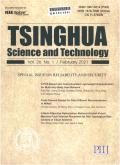Endogenous Security Formal Definition, Innovation Mechanisms, and Experiment Research in Industrial Internet
IF 3.5
1区 计算机科学
Q1 COMPUTER SCIENCE, INFORMATION SYSTEMS
引用次数: 0
Abstract
With the rapid development of information technologies, industrial Internet has become more open, and security issues have become more challenging. The endogenous security mechanism can achieve the autonomous immune mechanism without prior knowledge. However, endogenous security lacks a scientific and formal definition in industrial Internet. Therefore, firstly we give a formal definition of endogenous security in industrial Internet and propose a new industrial Internet endogenous security architecture with cost analysis. Secondly, the endogenous security innovation mechanism is clearly defined. Thirdly, an improved clone selection algorithm based on federated learning is proposed. Then, we analyze the threat model of the industrial Internet identity authentication scenario, and propose cross-domain authentication mechanism based on endogenous key and zero-knowledge proof. We conduct identity authentication experiments based on two types of blockchains and compare their experimental results. Based on the experimental analysis, Ethereum alliance blockchain can be used to provide the identity resolution services on the industrial Internet. Internet of Things Application (IOTA) public blockchain can be used for data aggregation analysis of Internet of Things (IoT) edge nodes. Finally, we propose three core challenges and solutions of endogenous security in industrial Internet and give future development directions.工业互联网内生安全的形式定义、创新机制及实验研究
随着信息技术的快速发展,工业互联网变得更加开放,安全问题也变得更加具有挑战性。内源性安全机制可以在没有先验知识的情况下实现自主免疫机制。然而,内生安全在工业互联网中缺乏一个科学而正式的定义。因此,我们首先给出了工业互联网内生安全的正式定义,并通过成本分析提出了一种新的工业互联网内生性安全架构。其次,明确了内生安全创新机制。第三,提出了一种改进的基于联合学习的克隆选择算法。然后,分析了工业互联网身份认证场景的威胁模型,提出了基于内生密钥和零知识证明的跨域认证机制。我们基于两种类型的区块链进行身份验证实验,并比较了它们的实验结果。基于实验分析,以太坊联盟区块链可以用于提供工业互联网上的身份解析服务。物联网应用(IOTA)公共区块链可用于物联网(IoT)边缘节点的数据聚合分析。最后,我们提出了工业互联网内生安全的三个核心挑战和解决方案,并给出了未来的发展方向。
本文章由计算机程序翻译,如有差异,请以英文原文为准。
求助全文
约1分钟内获得全文
求助全文

 求助内容:
求助内容: 应助结果提醒方式:
应助结果提醒方式:


